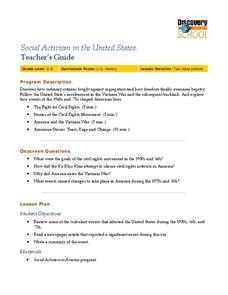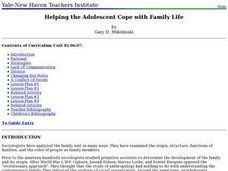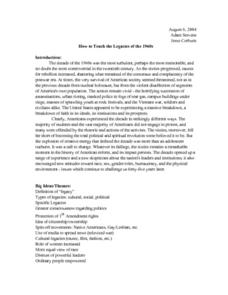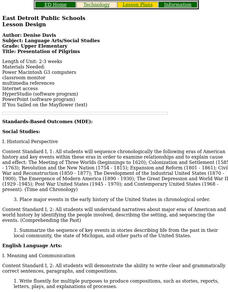Curated OER
Chapter 8: Reconstruction
In this Reconstruction instructional activity, students read assigned textbook pages regarding Reconstruction plans and respond to 44 short answer questions.
Curated OER
Westward Expansion Unit
Eighth graders investigate the importance of Westward Expansion in the history of the United States in this unit of lessons.
Curated OER
Social Activism in the United States
Seventh graders explore the goals of the Civil Rights Movement of the 1950s and 1960s. In this US History lesson plan, 7th graders read a newspaper article that reported a significant event during this era. Students write a summary of...
Curated OER
Social Changes in America Caused by World War II
Young scholars research and examine the social changes that occured in the United States during World War II. In pairs they conduct research using a variety of resources, and organize and compose a "Guide to Life" for veterans returning...
Curated OER
AFRICAN-AMERICAN POETRY BEFORE EMANCIPATION
Explore poetry written by African-Americans before emancipation. 8th graders create collages, and explain why they chose specific stanzas. They display the collages on the class bulletin board that demonstrate an understanding of the...
Museum of Tolerance
Disenfranchised People of the New Nation
Why are some immigrant groups in the United States embraced while others become disenfranchised? To answer this question, teams investigate why groups emigrated to the US, why some of these these peoples were disenfranchised, and their...
Curated OER
Lines Of Connection
We need the help of your history detectives! After giving them a set of questions to answer, reading groups must create their own timeline of the events. Then, as a class, have each group present their timelines. What is different? Why...
Curated OER
President William McKinley
In this US history worksheet, students read a biography about President William McKinley and answer 6 multiple choice questions.
Core Knowledge Foundation
Volume 2 - A History of the United States: Modern Times—Late 1800s to the 2000s
The second volume of the Core Knowledge History of the United States ebook begins by asking young scholars to consider the impact immigration, industrialization, and urbanization had on the United States in the late 1800s. The text ends...
Curated OER
Underground Railroad
Fourth graders use internet cites to explore the Underground Railroad. They also learn the importance of the Emancipation Proclamation. Focus questions are included.
Curated OER
Runaway Indentured Servants
Students compare and contrast indentured servants and slaves. In this US history slavery lesson, students discuss the owners' perceptions of indentured servants and slaves, then view ads for runaway slaves to support their opinions....
Curated OER
Helping the Adolescent Cope with Family Life
Young scholars are introduced to the proper ways to deal with conflict at home. In groups, they define family based on what it means to them and identify factors that lead to a breakdown in communications. They participate in...
Curated OER
How to Teach the Legacies of the 1960s
Students consider which aspects of world around them have roots in 1960s, research and compare 1960s to today with regards to Civil and Women's Rights, Vietnam, counterculture, music, voting, and economic rights, and explore legacy of...
Curated OER
This Guilty Land
Students read and discuss several informational cards about John Brown, the historical context he lived in and his abolitionist cause. They complete a character chart and write an epitaph that conveys their opinion of his actions.
Curated OER
Did Rome Fall, Or Was It Pushed?
Seventh graders work in teams to research the reasons for the fall of Rome and come to a conclusion of why it did.
Curated OER
Lincoln: The Man Who Needed Nevada
Students understand how Nevada became a state and the role of Abraham Lincoln in Nevada's statehood. In this Nevada statehood instructional activity, students listen to background information, primary sources and research about Nevada's...
Humanities Texas
Primary Source Worksheet: Abraham Lincoln, Draft of the Gettysburg Address
Young historians closely examine the words of Abraham Lincoln's Gettysburg Address with this primary source analysis worksheet.
Curated OER
Simple Cycles
Young scholars use Inspiration to map cyclical events. They recognize links between separate events and structural patterns. They explore the Internet Connection section to browse additional resources on teaching about cycles used in...
Curated OER
The Gettysburg Address
In this social studies worksheet, students read the Gettysburg Address. Students substitute words or phrases that have the same meanings as 10 underlined phrases from the Address.
Curated OER
Slavery issue and view North versus South around 1850s
Students critique actions based on information from both sides of the argument. They analyze impact of slavery on both sides. Students recognize governmental attempts at pacifying the situation. They examine sources and critique them and...
Curated OER
Underground Railroad
Students research and discuss the use of the Underground Railroad by fugitive slaves. They debate the actions of abolitionists and slave owners according to the laws of the time, create drawings and write narratives.
Curated OER
Presentation of Pilgrims
Learners are given a category to research (clothes, life before the New World, the voyage, etc.) about Pilgrim life. s Students, in groups, create presentations using software program such as PowerPoint.
Curated OER
This Guilty Land
Middle schoolers investigate the actions and motives of John Brown. In this abolition lesson, students discover details about Brown's background as a free-state and abolition supporter. Middle schoolers discuss his role as that of a...
Curated OER
Slavery Issue And Views North Versus South Around 1850s
Tenth graders compare and contrast the opinions of northerners and southerners about the issue of slavery in the 1850's. They study how the legislation that was enacted by Congress addressed the issues. As they investigate, they create a...

























